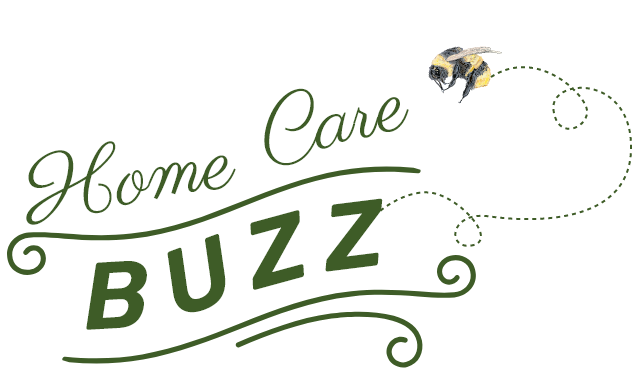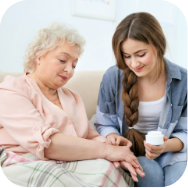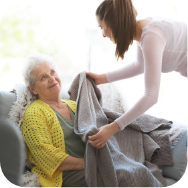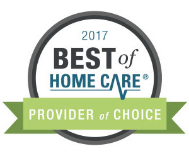Coronavirus Scams and Hoaxes Targeting the Elderly

Scammers feed on heightened fear, stress, and feelings of uncertainty brought upon by natural disasters and catastrophic events. Covid-19 has become, yet another way to exploit the vulnerable. Older adults, specifically those who are less experienced with the Internet and technology, are often targets of these manipulative schemes. Those who may be experiencing cognitive decline and those who are emotionally taxed by the onslaught of disheartening news are even more vulnerable, having been isolated from loved ones due to social distancing. The number of those who find themselves victims to these COVID-19-related phone or internet scams are simply staggering. Spreading awareness to seniors and keeping families and on alert is the best defense against these criminal offenses. Be aware of telemarketing and online scams that may be targeting your senior loved one. Here are some of the reported coronavirus-related scams to be mindful of:
Home Test Kits for COVID-19 - Scammers are posing as officials from the U.S. Centers for Medicare and Medicaid Services (CMS) and asking seniors to “verify” their Medicare ID or Social Security number. Scammers may also ask victims to provide their home addresses, stating that they want to drop off the test kit.
COVID-19-related Products and Services - Fake vaccines, air filter devices, and drugs that claim to prevent or cure COVID-19. Some of these scams prey on fears of shortages and encourage older adults to “stock up” and purchase items at drastically higher prices. Other scams are offering services, such as in-home HVAC cleaning or mosquito abatement, that falsely claim to protect people from contracting COVID-19.
Free Gifts and Fake Gift Cards - Fake gift-card emails are also being sent to vulnerable older adults to offer “assistance” during the crisis or “reward” people for following public health guidelines.
Impersonating Government Agencies - Some scammers pose as someone from the Social Security Administration and call elderly recipients to tell them their benefits will be suspended or decreased due to COVID-19 unless they provide personal information or payment.
Insurance scams - Offers of low-cost health and life insurance may be sold, often in conjunction with at-home COVID-19 test kits or other products.
Charity Scams - Charity scams attempt to collect money for bogus COVID-19 relief charities.
Stimulus-related Scams - The Federal Communications Commission (FCC) is aware of several scams related to the stimulus payments and loans that are being offered as part of the federal government’s response to COVID-19. Consumers are asked to provide bank account information so funds can be “transferred or released” so that loan applications can be approved.
The Federal Communications Commission (FCC) has also released the following guidelines that may help you and your loved ones from falling victim to these scams.
- Never disclose personal or financial information via phone, email, or text. As a general rule, keeping private information private. Legitimate government agencies will never ask people to provide personal or payment information via phone, text, or email.
- Refrain from engaging in phone calls or responding to text messages that come from unknown or suspicious phone numbers and/or emails.
- Be wary of any caller who is insisting that immediate payment be made by phone or pressures you to divulge personal information.
- Refrain from opening or “clicking” on suspicious links in text messages or emails, even if they may appear to come from family member or friend.
- Verify charities by calling or checking the organization’s website before agreeing to donate any funds.
What should you do if your Senior Loved One is a Victim of a COVID-19 Scam?
Each day, we continue to hear of new methods to exploit the COVID-19 crisis worldwide. Stay informed keeping your senior loved ones informed and on alert. If you or your loved one find yourself in a situation where the privacy of your information has been compromised or disclosed as a result of emails and or phone calls, it is important to report the incident, no matter how discouraging or embarrassing. Reporting this incident may help mitigate potential damage to your accounts and identity. It might also prevent future fraud from occurring and save another senior from the emotional distress of encountering the same situation.
For situations where the intended victim is specifically a senior, a good reporting option is to contact, the Department of Justice's newly launched reporting hotline, the National Elder Fraud Hotline at 1-833-FRAUD-11. Any COVID-19 fraud, no matter the age of the intended victim, should also be reported to the National Center for Disaster Fraud at 1-866-720-5721.
How Safe Are You Online?
Seniors can further protect themselves from being a target online by following these general guidelines:
- Take time to secure and password-protect all of your devices and accounts, including tablets and smartphones.
- Choosing passwords that include a combination of numbers, letters and symbols can further protect your devices and accounts. Handwrite your “log-in information and password” in a small, unmarked notebook that can be readily available as needed.
- If provided the option, choose a “two-step authentication” when establishing accounts for a second layer of protection versus the convenience. You may even consider using the assistance of apps or websites that are created specifically to increase password/log-in security.
- A popular option of such, is LockDownYourLogin.com.
- Make it a habit to delete unwanted emails from unknown senders or emails that may look suspicious. Refrain from opening unusual emails that are sent by unknown companies and individuals.
- Adjust your privacy settings to limit what you can download, who can access your information and disable the location sharing option.
- Set your computer and/or device to clear your browsing history on a daily basis.
- One out of 5 seniors currently use security software. Install anti-virus and anti-spyware software and programs so that it runs regularly.
- Always log out yourself out of your accounts and websites when you are finished. Leaving apps and websites open leaves your security and privacy vulnerable to hackers.
- Only 32% of seniors are confident about using the internet. Gain confidence by gaining knowledge and practice.

























